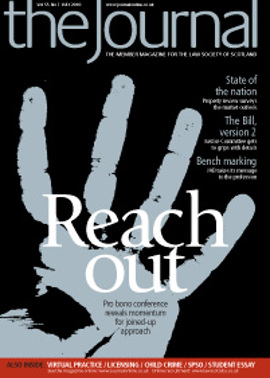Free to give

The idea for some form of compulsory pro bono work came about because "access to justice for the poor and needy" is always mentioned in the arguments for and against alternative business structures (ABS) or in the perceived effects of the Legal Services (Scotland) Bill.
With the Salvation Army opening a law firm in Australia, it seemed an obvious step for other charities to buy into or create law firms in Scotland, and this could economically squeeze existing firms even further.
If all firms offered a set number of hours pro bono across the board, and not simply as a marketing issue for selected firms, this would open up legal services to the poor and needy wherever they are located.
In addition, the internet has flooded the marketplace with free legal information. The currency of that free information is attention. Time (or attention) spent on a website boosts its page rankings and gives it credibility. Even amateur legal websites are gaining credibility. Now the professionals and amateurs are suddenly in the same legal information marketplace.
And there are a lot more amateurs than professionals.
This leaves a lot of people with a lot of information, but with no real knowledge of how to apply it... and for that reason they need, nay MUST, speak to a solicitor.
To continue with the internet concept for a second, websites that create trust, get "traffic". In other words, the reputation of the site brings it business. Lawyers already have (or should have) trust and reputation, but they don't get "traffic" because the perception is that they are too expensive. If everyone feels that they can walk into any law firm to make sense of their free information, that will naturally lead to more paid business and in turn remove or reduce the perception that lawyers are "unapproachable and expensive".
But why do pro bono work? Adam Smith said that "enlightened self-interest is the most powerful force in humanity".
Nowadays, in a world where all our subsistence needs are met, we find ourselves with spare cycles of what sociologists call "cognitive surplus", or energy and knowledge that are not fully tapped by our jobs.
At the same time we have emotional and intellectual needs that are not fully satisfied at work either.
In short, doing things we like without pay often makes us happier than the work we do for a salary. You still have to eat, but there is more to life than that. The opportunity to contribute in a way that is both creative and appreciated is exactly the sort of fulfilment that is privileged above all other aspirations - and many jobs do not provide that.
Many lawyers say that they already do plenty of pro bono work. They must be sole practitioners or partners, because according to the Ministry of Justice February 2008 report into the extent and value of pro bono work, employed lawyers are driven by financial targets and constraints and not allowed in many cases to do pro bono work without answering to someone above. This is insulting to intelligent, professional people who have to ask for permission to do something good. The compulsory element is needed to level the playing field for all lawyers.
If you don't want to do it, then there should be some mechanism to help with unmet legal need, or as Professor Donald Nicolson suggested: "Those who do not want to provide their service free, should make a pro rata contribution to a central 'access to justice fund' and these can be used to support those who do, such as law clinics, the Faculty's Free Legal Services Unit and LawWorks, which is about to be launched in Scotland to co-ordinate and foster pro bono amongst solicitors and law students."
In conclusion, there is an unmet legal need as far as the poor and needy are concerned. The upcoming changes in the legal sector and the threats to our business provide an ideal opportunity for the profession to be innovative. The Ministry of Justice report points to a long history of pro bono work. In that same report, 58% of legal executives would like to help when the mechanism allows. At present the mechanism does not allow it, so let's change it.
The answer proposed by Raymond McLennan is that we should all be forced to carry out pro bono work.
But what is the question?
Raymond suggests that our competition in the future will not be Tesco but will be the likes of charitable bodies such as the Salvation Army and others.
He says that to compete with this, we should act now. Raymond has, also, told me of his view that, to retain clients, the profession needs to innovate and market itself.
I'm not writing here, merely, to counter Raymond's argument about pro bono work. Raymond is right about some things. We do need to market ourselves. We do need to innovate. I shall return to this later.
The definition of "pro bono" is "done for the public good without compensation", and words that I would associate with this are "charitable", "generous", "kindly", "open-palmed" - all words relating to the giving of something out of an internal desire to do good.
I think a lot of us do pro bono work. I certainly do. I have done myriads of free 15-minute diagnostic interviews.
Although my wife would doubt it, I must have some of this "cognitive surplus". In addition, I publicise the good work that my staff and I do for charity. As a result, the message has come over that I am, after all, human, that I care, that I am approachable and I am not a toff.
The point, however, is that I do it because I want to do it. If I am forced to do it, it is no longer "pro bono" and the pleasure will come out of it.
As I have said to Raymond, his proposal is both repugnant and immoral. To be forced to do something for nothing is slavery:
"the subjection of a person to another person, especially in being forced into work". To force those in our employ to do pro bono work would be to be complicit in slavery. Can we presume that, being pro bono, no payment would be expected by our employees?
If that were not bad enough, I glean from our correspondence that the anticipation is that, with this pro bono work, we will change the public perception of solicitors.
It won't. In fact, it would have a negative impact on the public regard for the profession. He is inviting the Government to force us to do something - thereby implying that we don't do it already.
Raymond has his finger on the button here, though. There is a real problem with the public perception of solicitors. It can be stated as "all solicitors are rogues... except mine".
Why is this? It is a marketing issue. It's because we don't get our act together and drip feed the public with all the good news stories that exist.
I do it, but Raymond has a point - it needs to be done collectively.
In my view, the profession, through the Law Society, should employ someone permanently dedicated to this task of changing perceptions as to who we are and what we do. It will take some time, but I have no doubt whatsoever that we would be successful.
The other point raised by Raymond is that of innovation.
We certainly need to innovate. Doing things the way we have always done it, just because we've always done it that way, will not cut the mustard in the future.
Raymond does not think Tesco would be our competitors. I think that they (and others like them) will. They do not think the way we do. They probably will not produce a better product, but they will innovate and they will, very definitely, market their products much better than we do.
On his blog, Raymond quotes Sam Walton, Founder of Wal-Mart, owners of Asda: "There is only one boss: the customer. And he can fire everybody in the company from the chairman on down simply by spending his money somewhere else."
I couldn't agree more.
In this issue
- Drop everything
- Free to give
- For the common good
- "Not for the likes of me"?
- RoS fees up for review
- Taking shape
- Criminalising children
- Split decision
- A picture's worth a thousand words
- "Duty to trade" revisited
- Law reform update
- From the Brussels office
- Join the cloud
- Combating claims in interesting times
- Ask Ash
- Party confidential
- What fresh hell is this?
- Links with the past
- Stranger than fiction
- Acts of kindness
- Scottish Solicitors' Discipline Tribunal
- Website review
- Book reviews
- Service driver
- Forecast: cloudy






